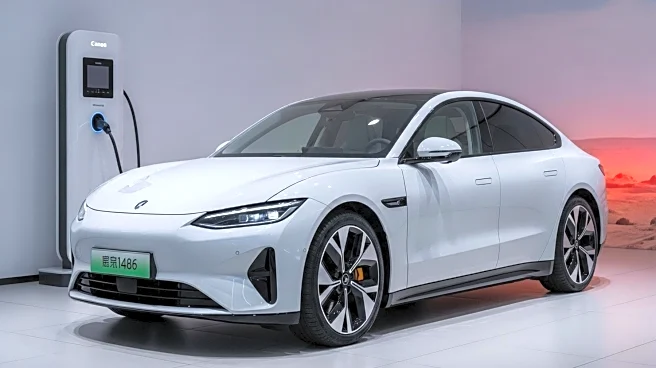What's Happening?
Lucid Motors has reported a record delivery of 4,078 vehicles in the third quarter, driven by increased sales of its Gravity SUVs and a surge in customers capitalizing on the expiring federal EV tax credit. Despite these gains, the company remains below the ambitious projections set during its public offering in 2021, which raised $4 billion. The third-quarter figures mark the seventh consecutive quarter of sales growth for Lucid Motors. The company is also expanding its presence in Saudi Arabia, where it has built over 1,000 vehicles for the market and plans to establish a full-fledged factory. Additionally, Lucid Motors has secured future demand from Uber, which plans to purchase 20,000 Gravity SUVs for use as robotaxis, integrating Nuro's autonomous technology.
Why It's Important?
The record deliveries by Lucid Motors highlight the growing demand for electric vehicles, particularly luxury models, as consumers rush to benefit from expiring tax incentives. This trend is significant for the U.S. automotive industry, indicating a shift towards sustainable transportation solutions. Lucid's expansion into the Saudi market underscores the strategic importance of international markets for U.S. EV manufacturers, especially in regions with substantial investment capabilities. The partnership with Uber represents a potential shift in urban mobility, as autonomous vehicles become more integrated into public transportation networks. These developments could influence policy decisions regarding EV incentives and autonomous vehicle regulations.
What's Next?
Lucid Motors is set to release its full financial results for the quarter on November 5, which will provide further insights into its performance and future strategies. The company's expansion in Saudi Arabia and its partnership with Uber may lead to increased production and technological advancements. Stakeholders, including investors and policymakers, will likely monitor these developments closely, as they could impact the broader EV market and regulatory landscape. The expiration of the federal EV tax credit may also prompt discussions on future incentives to sustain the growth of the electric vehicle sector.
Beyond the Headlines
Lucid Motors' reliance on international markets and partnerships with companies like Uber highlights the interconnected nature of the global automotive industry. The company's strategy to leverage Saudi investment and expand its manufacturing capabilities abroad may set a precedent for other U.S. automakers seeking growth opportunities. Additionally, the integration of autonomous technology into Lucid's vehicles could accelerate the adoption of self-driving cars, raising ethical and legal questions about safety, data privacy, and employment in the transportation sector.









